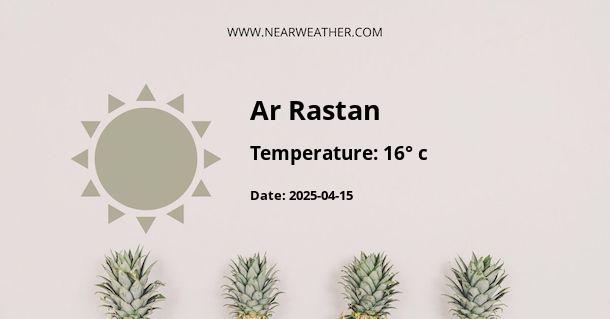Introduction
Ar Rastan, a city located in the northern part of Syria, holds a rich historical significance and distinct climatic characteristics. The city's geographical location plays a significant role in determining its climate, which is primarily characterized by a cold desert climate. This article explores the unique weather patterns and climatic conditions of Ar Rastan throughout the year.
Geographical Location
Ar Rastan is located in the Homs Governorate in northern Syria, roughly 25 kilometers north of the city of Homs. It sits at an elevation of about 460 meters above sea level, which affects its overall climate.
Climate Overview
The Koppen-Geiger climate classification categorizes the climate of Ar Rastan as cold desert climate (BWk). This type of climate is characterized by minimal rainfall and significant temperature variations between day and night and throughout the seasons.
Temperature
Ar Rastan experiences a wide range of temperatures throughout the year. The average annual temperature is approximately 17.8°C.
The highest average temperature typically occurs in July, reaching up to 30°C. Conversely, the coldest month is usually January, with an average temperature of around 5.6°C.
Seasonal Variations
Spring
Spring in Ar Rastan, from March to May, is characterized by gradually rising temperatures. March sees an average high of 17°C, which increases to 23°C in April, and further to 29°C in May.
Summer
The summer months of June through August are typically the hottest, with average highs of 33°C to 35°C. Despite the high temperatures during the day, nights can be quite cool due to the desert climate.
Autumn
Autumn, from September to November, sees a gradual decrease in temperatures. September starts with an average high of 31°C, falling to 26°C in October and 19°C in November.
Winter
Winter in Ar Rastan, from December to February, is generally cold with average high temperatures ranging from 12°C to 14°C. Nighttime temperatures can drop significantly, often falling below freezing.
Precipitation
Ar Rastan receives minimal rainfall due to its desert climate. The average annual precipitation is about 286 mm.
Most of the rainfall occurs in the winter, with December being the wettest month, receiving an average of 63 mm of precipitation. The summer months are typically dry, with almost negligible rainfall.
Conclusion
Understanding the climate and weather of a location like Ar Rastan is crucial for many reasons. It impacts everything from agriculture and water resources to tourism and urban planning. The unique geographical location and desert climate of Ar Rastan offer a fascinating study of weather patterns and climatic variations.
A - Ar Rastan's Latitude is 34.926529 & Longitude is 36.732380.
A - Weather in Ar Rastan is 16° today.
A - Climate Conditions in Ar Rastan shows scattered clouds today.
A - Humidity in Ar Rastan is 30% today.
A - Wind speed in Ar Rastan is 34.31 km/h, flowing at 281° wind direction. today.
